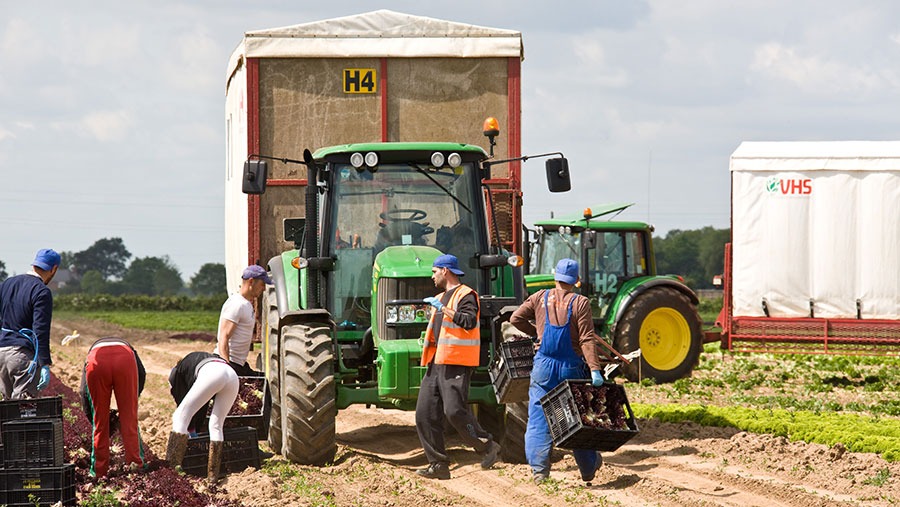How to help EU staff achieve settled status to work in UK
 © Tim Scrivener
© Tim Scrivener More than three million EU citizens have requested to live and work in the UK permanently after Brexit.
However, hundreds of thousands are still to apply under the EU settlement scheme, and rural businesses, concerned at the prospect of losing vital staff, are encouraging workers to apply without delay.
See also: How contractors can avoid penalties on self-employed staff
To continue to live and work in the UK beyond 30 June 2021, workers must have lived in the UK before 31 December 2020 and successfully applied to the scheme.
The deadline for applications, which are free but can only be made and managed online on the Gov.uk website, is 30 June 2021.
A successful application means either settled or pre-settled status has been granted.
This will allow EU citizens to:
- Work in the UK
- Use the NHS
- Enrol in education or continue studying
- Access public funds such as benefits and pensions
- Travel in and out of the UK
Each carries different rights to remain and depends on how long a worker has lived in the UK.
Settled status
Under settled status, applicants can remain in the UK permanently.
Settled status may be granted to someone who will have been living in the UK continuously for the five years to 31 December 2020.
Continuous means at least six months in any 12-month period for each of the five years.
Settled status applicants will need to provide a passport, national identity card or National Insurance number.
Pre-settled status
Pre-settled status is more likely if an applicant has less than five years’ continuous residence.
This allows the applicant to stay in the UK for a further five years from the date pre-settled status is achieved.
For pre-settled status, EU citizens only need to have lived in the UK for one day in the six months to 31 December 2020. A payslip or utility bill showing their address is satisfactory.
Once five years of continuous residence has been achieved, a worker can then apply for settled status.
Further information
A full checklist of required documents can be found on the Gov.uk website, and an online document checking service is also provided.
Charity help: A new charity called Settled offers free support for EU nationals with little English or IT skills.
Case study: James Foskett Farms, Woodbridge, Suffolk
Farm facts
- 880ha – 30 crops, including cereals, field-scale vegetables and sugar beet
- Managed by Mike Shapland, Farmers Weekly 2018 Farm Manager of the Year
Up to 75 seasonal workers are employed during the peak summer season, mostly from Romania.
The farm’s financial manager, Mihai Dumitrescu, oversees the support process for workers who want to apply.
“We value our staff and want them to continue working here, so we help them through what can be an off-putting process, says Mr Dumitrescu.
This year’s intake will undergo a detailed briefing and have more information on settled status in their induction programme.
The farm has also appointed one person who speaks Romanian to support staff individually.
“This is important, because the application process can use precise, official terms that need explaining,” saysMr Dumitrescu.
Stumbling blocks
One of the major stumbling blocks so far has surrounded ID cards.
The system has a “smart” form on a smartphone app that allows applicants to scan in passport details.
But many EU workers only hold national ID cards.
“These cards have to be posted for checking. This was a major deterrent to applying, because workers didn’t trust the post with their documents,” Mr Dumitrescu says.
Another issue surrounds length of service. Many thought long service – beyond five years -would guarantee settled status.
“But some were rejected, even though they had been in the UK for 10 or 20 years, because of gaps in documentation,” he says.
In contrast, those who had a British National Insurance (NI) number and had worked at a single company with proof of address found it straightforward.
Of 80% who applied at the farm, two-thirds successfully attained pre-settlement status while EU settled status was granted to just 10 workers.
Tips for managers
- Make sure staff have ID or passport
- Provide support throughout
- Find someone who speaks the individual’s language
- Support on a one-to-one basis because each case is different
- Find out why workers are not applying, it could be a small issue
- Encourage workers to apply
